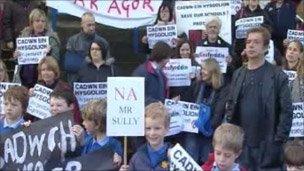Row over Carmarthenshire school closure numbers
- Published

Parents and pupils protested ahead of Monday's meeting
A row has broken out in Carmarthenshire over planned school closures.
Education officers had said they wanted to cut the number of primary schools from 115 to 84 to tackle surplus places and buildings in poor repair.
But councillors have said specific figures should be removed from a document as there must be consultation before any school can close.
About 50 parents and children protested outside county hall in Carmarthen ahead of the meeting.
Under the latest update to its Modernising Education Programme, the council says there are 10 schools to be reviewed as they are not considered to be viable in the long term.
The document listed another 31 to be looked at but members of the council's education scrutiny committee have called for the list to be removed.
'Poor condition'
They said there would need to widespread consultation before they could close and naming them could give the appearance that their future had already been settled.
The Modernising Education Programme has been in existence since 2005, and around £108m in new school facilities will have been invested by the end of this year.
But there are still more than 5,000 surplus places in schools in Carmarthenshire, even though 1,700 have already been removed.
Also, according to the report, 55% of pupils are being educated in schools described as in a "poor condition."
Education officials have prepared the document to bid for funding from the Welsh Assembly Government's 21st Century Schools fund.
Rob Sully, the director of education and children's services, described the task of transforming education in Carmarthenshire as an "enormous challenge."
The campaign group Cymdeithas yr Iaith Gymraeg (Welsh Language Society), which organised the protest, said: "Councillors from all parties agreed that including this wording gives the impression that the council have already made their decision concerning the future of these schools, and that it should be deleted so that the consultation with the schools could be fair, open and positive."
- Published22 October 2010
- Published13 August 2010
- Published13 August 2010